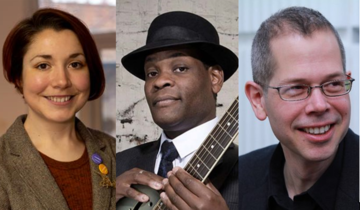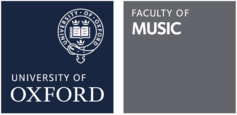Seminar in Ethnomusicology and Sound Studies: Lauren Redhead, Tom Attah and Byron Dueck (with responses from Alice Hill and Oliver Chandler)
Reimagining Methods and Approaches for Teaching Music Theory to Higher Education Students

Free to attend, no registration required. Click here to join the Zoom meeting.
Lauren Redhead (Goldsmiths, University of London); Tom Attah (Leeds Arts University); Byron Dueck (Open University)
The question of how to present musical-theoretical content within contemporary Higher Education curriculum is not a simple one: on the one hand, many students express an interest in learning musical-theoretical skills that are of value to their own creative practices while, on the other, many contemporary musical practices do not require such knowledge for success. In addition, the variety of educational and autodidactic backgrounds that lead students to Higher Music Education mean that a comparable baseline of knowledge in this area cannot be assumed. This themed session draws on ongoing discussions within the EDIMS Working Group ‘Reimagining the HE Music Curriculum’, and the Music Theory subgroup that was formed within it. The session will comprise reflections on recent curriculum design—and responses to these—including on a new programme at Leeds Arts University, new module development at the OU, and a curriculum review and concurrent research project (Muso-Gym) at Goldsmiths. The panel and respondents will address questions such as bridging the educational deficit in Music at level 3, the value of music-theoretical skills to students beyond education and in their lives in music, and methods of digital learning and engagement. The panel do not present our solutions as the sole examples of good practice in the sector, but aim to share experience and invite discussion about how learning in the area of music theory can be made accessible, practical and relevant for the groups of students we encounter.
This session addresses possible solutions for engaging diverse student groups in HE in music-theoretical content, considering the variety of educational backgrounds from which students may enter Higher Education. We give particular consideration to the variety of further educational and autodidactic backgrounds that may now be routes into Higher Music Education, especially given the current music educational context in the UK. The panel will not approach the question as researchers in the broad field of Music Theory but rather as educational practitioners looking to engage students in a variety of musical literacies as part of their higher music education. The questions addressed are of relevance to all academics involved in curriculum design in UK universities, and to educators seeking to prepare students for Higher Education in Music.
Dr Lauren Redhead's primary interests are in 20th and 21st Century Music; her musicological work focuses on the aesthetics and sociosemiotics of music, psychoanalytic perspectives on music, minority discourse, anti-aesthetics, materialism and notation. She is also a composer of experimental music whose scores are published by Material Press (Berlin) and a performer of music for organ and electronics. Her music has been released on the engraved glass, sfz music, Innova, and pan y Rosas discos labels. Her current research falls into three broad areas: the methodological critique of practice research, concentrating on its epistemology and phenomenology; the investigation of materiality and notation through experimental approaches to composition; and the development of live-interactive approaches to performance for organ and electronics through collaboration with other composers. She has recently published on the music of composers Michael Finnissy, Chris Newman, and Annette Schmucki. From 2013-2018 she was the president of the RMA’s Music and/as Process Study group, in which role she organised many conferences and edited two collected volumes of research. She was the chair of the conference committee for the RMA’s 56th Annual Conference in 2020 which took place as an online event.
Dr Tom Attah is a practising musician, and Course Leader for BMus (Hons) Popular Music Performance at Leeds Arts University. His research interests include the effects of technology on popular music, particularly blues music and blues culture. As a guitarist and singer, Tom performs solo, with an acoustic duo and as part of an electric band. Tom's solo acoustic work includes his own original Blues compositions and has led to performances at major music festivals around Europe, including major stages at the Glastonbury Festival of Contemporary Performing Arts, the Great British Rhythm & Blues Festival, and Blues Autour Du Zinc. Tom’s live work includes theatre and festival performances, workshops, seminars, lectures and recitals delivered to learning institutions, artistic communities and blues dance specialist events in the United Kingdom, mainland Europe, Russia, and the United States. Tom's original music commissions include composing and performing the music for the HandelHendrix permanent exhibition in Mayfair, London, and Tom's multiple national radio appearances include performances and documentaries for BBC Radio 2, BBC Radio 4, and Sky Arts.
Professor Byron Dueck joined the Open University Music Department in January 2012. He was previously Lecturer in Music at the Royal Northern College of Music and before that held posts as University Fellow in Music at the Open University and Coordinator of Musicology at Columbia College Chicago. He studied ethnomusicology at the University of Chicago, where his doctoral research focused on public performances of First Nations and Métis music and dance in the western Canadian city of Winnipeg. His earlier musical studies, in piano performance, were undertaken at the University of Minnesota (MMus 1998) and Wilfrid Laurier University (BMus 1994).
About the series:
The Seminar in Ethnomusicology and Sound Studies is convened by Professor Jason Stanyek of the University of Oxford. Former convenors of the series were Professor Martin Stokes (currently at King’s College London) and Professor Noel Lobley (currently at the University of Virginia). Featuring lectures by leading scholars who have adventurous takes on musical and sonic cultures, the series has a particular grounding in anthropology, sound studies, and ethnomusicology. We typically hold two or three seminars each academic term. Our standard meeting time is on Thursdays at 5pm and events usually take place at or near St John’s College. Our seminars are open to all and admission is free. There is a wine reception after each talk. If you have any questions about the series please contact Professor Stanyek.



